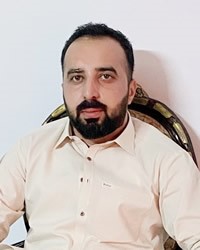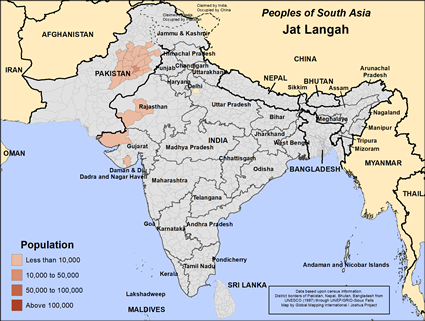Some experts believe the Langah Jats are related to the Pashtun people groups who live in Afghanistan. Others believe they came from Arabia. What is known is that in 1445 Saikh Yousaf Qureshi, a powerful Langah leader, took control of Punjab and founded a dynasty that ruled this region until 1460. Today the Langah are no longer politically powerful, but they haven't lost their faith in Allah. All of them are Sunni Muslims.
We still know Jats for their pride, bravery and readiness to sacrifice their lives in battle for their people and kin. Many in today's Pakistan chose a career in the military, though they are more likely to be agricultural landowners. A small percentage are traders and laborers.
At the village level, Langah Jats appear to be democratic. They prefer elected village headmen and have little reverence for hereditary rights. They reserve leading positions for men.
Conservative by nature, the Langah Jats rarely marry people from other people groups. From about 1650 AD onwards marrying within same gotra (ie, lineage or community) became more common. The modern-day litmus test Jat people use in marriage is if the girl and boy must not have the same great-great-grandparents (not related for four generations). If they are from the same gotra but are not directly related for four generations then it is considered acceptable for them to marry. Widow marriage is a social obligation. Jat women have inferior status to men. They must marry young, and few get the chance for an education.
The joint family system was popular amongst the Jats and large families used to share the same house and hearth. With the advancement of modern civilization, as people are becoming less dependent upon each other, the joint family system is going out of vogue.
In recent generations, many Jats have moved from agriculture to urban jobs in Pakistan. Though they traditionally didn't have high social status, Jats are gaining that today. They play a dominant role in Pakistan's public arena. There have been prominent Pakistani politicians with a Jat background. Today, the Jats are well read, and some occupy high positions in academic and technical arenas.
Langah Jats are taught at an early age that Islam is the perfect religion, and that the Bible is in error. Very few of them have a chance to hear a Christian tell them otherwise.
This people group speaks Western Punjabi, a language with many Christian resources. Perhaps someone can call their attention to gospel recordings, the JESUS Film, and radio broadcasts that they can access via the Internet in the privacy of their own homes.
They are 100 percent Muslim, with no known followers of Christ. Ask God to break the hold that Islam has on the Langah Jats of Pakistan and replace it with a dedication to Jesus Christ.
Pray that the Lord will open doors for true believers to reach out to them to invite them to become part of the kingdom of God.
Pray that believers will soon give them scripture, tracts and gospel recordings in Western Punjabi.
Scripture Prayers for the Jat Langah in Pakistan.
https://www.jatland.com/home/Gotras
https://en.wikipedia.org/wiki/Jat_people
https://www.britannica.com/topic/Jat
http://www.dawn.com/news/1077113
https://www.jatland.com/home/Jats
http://indianex
| Profile Source: Joshua Project |











